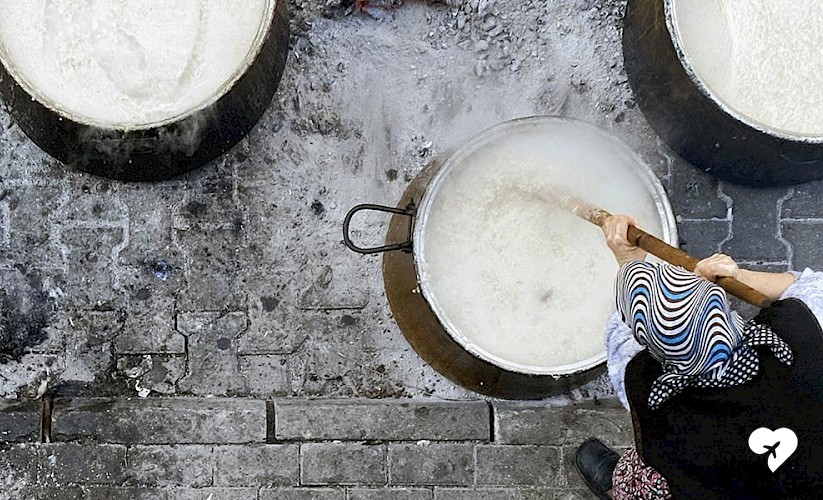The ceremonial meal where groups of men and women all work together cooking wheat and meat in large cauldrons over an open fire is called "keşkek", and the rituals that accompany the meal are called the Ceremonial Keşkek Tradition. The keşkek tradition is a social practice of solidarity performed on the basis of joint labor and sharing in ceremonies where community participation is high. Symbolic aspects of the tradition include beating the wheat and meat for a long time before the keşkek is cooked, and stirring the food with a shared rhythm while it is boiling.
Although the Ceremonial Keşkek Tradition is performed throughout Turkey, it is in provinces like Yozgat, Çorum, Çankırı, Amasya, Sinop, Adana, Erzincan, Tokat, Tekirdağ, Aydın, Muş, Muğla, Uşak, Sivas, Kırşehir, İzmir, Uşak, Antalya, Afyonkarahisar and Kastamonu, that the traditional rules and rituals of the ceremony are regularly performed. Ceremonial keşkek is cooked and distributed on special occasions such as circumcision parties, weddings, Ramadan and Kurban holidays, pilgrimage meals, public prayers for rain and mevlüt gatherings, or special celebrations like Hıdırellez. The keşkek meal, which is one part of the keşkek tradition, can be viewed as a meal outside of the ceremonial dimension in homes or restaurants.

The process of making and consuming keşkek is one of the important elements of the ceremonial keşkek tradition, and has become a symbol of special occasions and ceremonies, which have a collective nature. The keşkek ingredients and preparation are provided voluntarily, especially in the villages. The main keşkek ingredients of wheat and meat are provided by the household when there is a family celebration while the necessary labor is provided by contributions from the residents of the village. In joint ceremonies such as feasts or celebrations, the basic ingredients and labor are provided by the villagers in proportion to their means.
People of any age, gender, ethnic group and culture, whether invited or not, may participate in the keşkek ceremony, which provides an opportunity for dialogue and developing community relationships. Every individual included in the ceremonial keşkek is a part of this cultural environment.
The continuation of the ceremonial keşkek tradition along with the production of the tools such as wooden ladles, mallets, tampers, dippers, etc. required to make keşkek are an opportunity to see and develop the creative aspects of society. The stone mortar requires special craftsmanship and belongs to the community. Special significance is attached to the mortar and everyone is responsible for keeping it clean. The large copper cauldrons used in the ceremony are meticulously refinished with tin every year by tinsmiths. Because of the durable, high quality craftsmanship, they last a long time and are reserved for joint use by the community. The large wooden ladles made by hand from resilient, odorless types of trees are important tools in the ceremonial keşkek meal in spite of their simplicity.
At the Keşkek Feast held in Çankırı, the preparation and service of the ceremonial keşkek is accompanied by a fireworks display and local entertainment. The goal of the feast is to meet and greet, strengthen unity and solidarity, and to keep our customs and traditions alive by transmitting them to future generations.
Within the scope of the action plan drawn up at the Ceremonial Keşkek Tradition Workshop organized in 2009 in cooperation with the Ministry of Culture and Tourism, the Çorum Municipality and civil society organizations, work is being conducted to keep the keşkek tradition alive, safeguard it and pass it down to future generations. Fieldwork, archiving and inventory work in this area is ongoing. Every year festivals, celebrations and feasts associated with the Keşkek Tradition are organized by local administrations and civil society organizations, which promote the tradition, keep it alive and bring it into an urban setting. Samples of the tools and equipment used to make ceremonial keşkek are exhibited and preserved in ethnographic museums in Turkey. The craftsmen who make these objects are invited to handicraft festivals organized by the Ministry.
The Ceremonial Keşkek Tradition was added to UNESCO's Representative List of the Intangible Cultural Heritage of Humanity in 2011.
